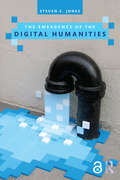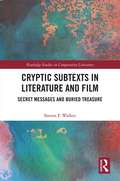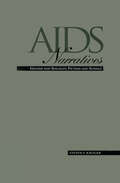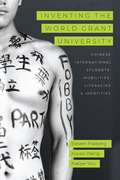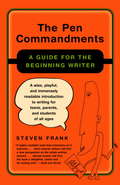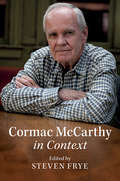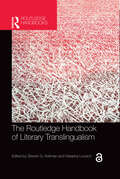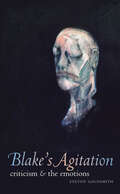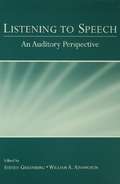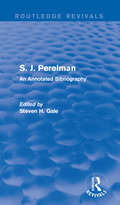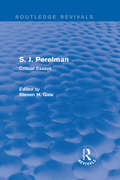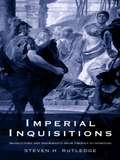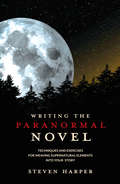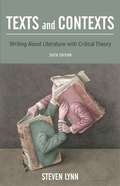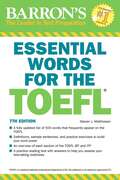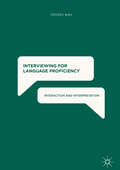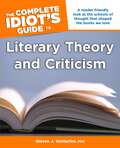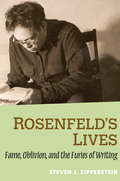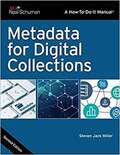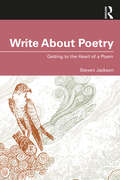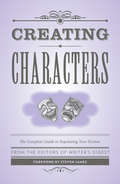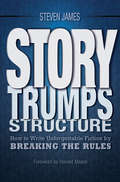- Table View
- List View
The Emergence of the Digital Humanities (Open Access)
by Steven E. JonesThe past decade has seen a profound shift in our collective understanding of the digital network. What was once understood to be a transcendent virtual reality is now experienced as a ubiquitous grid of data that we move through and interact with every day, raising new questions about the social, locative, embodied, and object-oriented nature of our experience in the networked world. In The Emergence of the Digital Humanities, Steven E. Jones examines this shift in our relationship to digital technology and the ways that it has affected humanities scholarship and the academy more broadly. Based on the premise that the network is now everywhere rather than merely "out there," Jones links together seemingly disparate cultural events—the essential features of popular social media, the rise of motion-control gaming and mobile platforms, the controversy over the "gamification" of everyday life, the spatial turn, fabrication and 3D printing, and electronic publishing—and argues that cultural responses to changes in technology provide an essential context for understanding the emergence of the digital humanities as a new field of study in this millennium. The Open Access version of this book, available at https://doi.org/10.4324/9780203093085, has been made available under a Creative Commons Attribution-Non Commercial-No Derivatives 4.0 license.
Cryptic Subtexts in Literature and Film: Secret Messages and Buried Treasure
by Steven F WalkerOne of the primary objectives of comparative literature is the study of the relationship of texts, also known as intertextuality, which is a means of contextualizing and analyzing the way literature grows and flourishes through inspiration and imitation, direct or indirect. When the inspiration and imitation is direct and obvious, the study of this rapport falls into the more restricted category of hypertextuality. What the author has labeled a cryptic subtext, however, is an extreme case of hypertextuality. It involves a series of allusions to another text that have been deliberately inserted by the author into the primary text as potential points of reference. This book takes a deep dive into a broad array of literature and film to explore these allusions and the hidden messages therein.
AIDS Narratives: Gender and Sexuality, Fiction and Science (Gender and Genre in Literature #7)
by Steven F. KrugerFirst published in 1996. Routledge is an imprint of Taylor & Francis, an informa company.
Inventing the World Grant University: Chinese International Students’ Mobilities, Literacies, and Identities
by Xiaoye You Steven Fraiberg Xiqiao WangThrough an exploration of the literacy practices of undergraduate Chinese international students in the United States and China, Inventing the World Grant University demonstrates the ways in which literacies, mobilities, and transnational identities are constructed and enacted across institutional and geographic borders. Steven Fraiberg, Xiqiao Wang, and Xiaoye You develop a mobile literacies framework for studying undergraduate Chinese international students enrolling at Western institutions, whose numbers have increased in recent years. Focusing on the literacy practices of these students at Michigan State University and at Sinoway International Education Summer School in China, Fraiberg, Wang, and You draw on a range of mobile methods to map the travel of languages, identities, ideologies, pedagogies, literacies, and underground economies across continents. Case studies of administrators’, teachers’, and students’ everyday literacy practices provide insight into the material and social structures shaping and shaped by a globalizing educational landscape. Advocating an expansion of focus from translingualism to transliteracy and from single-site analyses to multi-site approaches, this volume situates local classroom practices in the context of the world grant university. Inventing the World Grant University contributes to scholarship in mobility, literacy, spatial theory, transnationalism, and disciplinary enculturation. It further offers insight into the opportunities and challenges of enacting culturally relevant pedagogies.
The Pen Commandments
by Steven FrankSteven Frank has a new approach to writing: fun first, rules to follow, success for all. InThe Pen Commandments, his offbeat and entertaining guide, he's given us a book that all writers can turn to for help and a good laugh. With outrageous anecdotes (how a kid's oral surgery led to the ultimate writing assignment) and irreverent advice (Thou Shalt Not Kill Thy Sentences), Frank shows how to conquer writer's block, make friends with punctuation, and live forever in words. If you want to inspire your kids of just want to brush up on your own skills,The Pen Commandmentswill change-and enliven-the way you write forever.
Cormac McCarthy in Context (Literature in Context)
by Steven FryeCormac McCarthy is a writer informed by an intense curiosity. His interests range from the natural world, to philosophy and religion, to history and culture. Cormac McCarthy in Context offers readers the opportunity to understand how various influences inform his rich body of work. The collection explores the relationship McCarthy has with his favourite authors, writers such as Herman Melville, William Faulkner, and Ernest Hemingway. Other contexts are tremendously informative, including the American Romance tradition of the nineteenth century as well as modernity and the modernist literary movement. Influence and context are of absolute importance in understanding McCarthy, who is now being understood as one of the most significant authors of the contemporary period.
The Cambridge Companion to Cormac McCarthy
by Steven FryeCormac McCarthy both embodies and redefines the notion of the artist as outsider. His fiction draws on recognizable American themes and employs dense philosophical and theological subtexts, challenging readers by depicting the familiar as inscrutably foreign. The essays in this Companion offer a sophisticated yet concise introduction to McCarthy's difficult and provocative work. The contributors, an international team of McCarthy scholars, analyze some of the most well-known and commonly taught novels – Outer Dark, Blood Meridian, All the Pretty Horses and The Road – while providing detailed treatments of McCarthy's work in cinema, including the many adaptations of his novels to film. Designed for scholars, teachers and general readers, and complete with a chronology and bibliography for further reading, this Companion is an essential reference for anyone interested in gaining a deeper understanding of one of America's most celebrated living novelists.
The Routledge Handbook of Literary Translingualism (Routledge Literature Handbooks)
by Steven G. KellmanThough it might seem as modern as Samuel Beckett, Joseph Conrad, and Vladimir Nabokov, translingual writing - texts by authors using more than one language or a language other than their primary one - has an ancient pedigree. The Routledge Handbook of Literary Translingualism aims to provide a comprehensive overview of translingual literature in a wide variety of languages throughout the world, from ancient to modern times. The volume includes sections on: translingual genres - with chapters on memoir, poetry, fiction, drama, and cinema ancient, medieval, and modern translingualism global perspectives - chapters overseeing European, African, and Asian languages. Combining chapters from lead specialists in the field, this volume will be of interest to scholars, graduate students, and advanced undergraduates interested in investigating the vibrant area of translingual literature. Attracting scholars from a variety of disciplines, this interdisciplinary and pioneering Handbook will advance current scholarship of the permutations of languages among authors throughout time.
The Routledge Handbook of Literary Translingualism (Routledge Literature Handbooks)
by Steven G. KellmanThough it might seem as modern as Samuel Beckett, Joseph Conrad, and Vladimir Nabokov, translingual writing - texts by authors using more than one language or a language other than their primary one - has an ancient pedigree. The Routledge Handbook of Literary Translingualism aims to provide a comprehensive overview of translingual literature in a wide variety of languages throughout the world, from ancient to modern times.The volume includes sections on: translingual genres - with chapters on memoir, poetry, fiction, drama, and cinema ancient, medieval, and modern translingualism global perspectives - chapters overseeing European, African, and Asian languages Combining chapters from lead specialists in the field, this volume will be of interest to scholars, graduate students, and advanced undergraduates interested in investigating the vibrant area of translingual literature. Attracting scholars from a variety of disciplines, this interdisciplinary and pioneering Handbook will advance current scholarship of the permutations of languages among authors throughout time.
Blake's Agitation: Criticism and the Emotions
by Steven GoldsmithSince the Romantic period, the critical thinker's enthusiasm has served to substantiate his or her agency in the world.Blake’s Agitation is a thorough and engaging reflection on the dynamic, forward-moving, and active nature of critical thought. Steven Goldsmith investigates the modern notion that there’s a fiery feeling in critical thought, a form of emotion that gives authentic criticism the potential to go beyond interpreting the world. By arousing this critical excitement in readers and practitioners, theoretical writing has the power to alter the course of history, even when the only evidence of its impact is the emotion it arouses. Goldsmith identifies William Blake as a paradigmatic example of a socially critical writer who is moved by enthusiasm and whose work, in turn, inspires enthusiasm in his readers. He traces the particular feeling of engaged, dynamic urgency that characterizes criticism as a mode of action in Blake’s own work, in Blake scholarship, and in recent theoretical writings that identify the heightened affect of critical thought with the potential for genuine historical change. Within each of these horizons, the critical thinker’s enthusiasm serves to substantiate his or her agency in the world, supplying immediate, embodied evidence that criticism is not one thought-form among many but an action of consequence, accessing or even enabling the conditions of new possibility necessary for historical transformation to occur. The resulting picture of the emotional agency of criticism opens up a new angle on Blake’s literary and visual legacy and offers a vivid interrogation of the practical potential of theoretical discourse.
Listening to Speech: An Auditory Perspective
by Steven Greenberg William A. AinsworthThe human species is largely defined by its use of spoken language, so integral is speech communication to behavior and social interaction. Despite its importance in everyday life, comparatively little is known about the auditory mechanisms that underlie the ability to understand language. The current volume examines the perception and processing of speech from the perspective of the hearing system. The chapters in this book describe a comprehensive set of approaches to the scientific study of speech and hearing, ranging from anatomy and physiology, to psychophysics and perception, and computational modeling. The auditory basis of speech is examined within a biological and an evolutionary context, and its relevance to applied domains such as communication disorders and speech technology discussed in detail. This volume will be of interest to scientists, engineers, and clinicians whose professional work pertains to any aspect of spoken language or hearing science.
Encyclopedia of American Humorists (Routledge Revivals)
by Steven H. GaleFirst published in 1988, this book contains entries on famous American Humorists. Humor has been present in American literature, from the beginning, and has developed characteristics that reflect the American character, both regional and national. Although American literature was, in the past, treated as inferior to British literature, there has always been a large popular audience for the genre, which this book shows. The figures with entries in this encyclopedia not only amuse in their writing, but also aim to enlighten- setting out to expose the foibles and foolishness of society and the individuals who compose it. It is the manner in which these authors try to accomplish this end that determines whether they appear in the volume. Indeed, the book will demonstrate that the best humor has at its base, a ready understanding of human nature.
S. J. Perelman: An Annotated Bibliography (Routledge Revivals #Vol. 1274)
by Steven H. GaleFirst published in 1985, this bibliography focuses on the works of S. J. Perelman as a humorist, author, and screenwriter. It is divided into two major sections: "Works by S. J. Perelman" and "Critical Responses". Within each section, there are subdivisions which focus on various areas of S. J. Perelman’s work, including his novel, published plays and film scripts.
S. J. Perelman: Critical Essays (Routledge Revivals #Vol. 1274)
by Steven H. GaleFirst published in 1992, this book focuses on the oeuvre of S. J. Perelman. Taken together, the essays included serve as an introduction to this important humorist’s work, both in terms of the specific short prose pieces, plays, and films examined and as an overview of his lengthy professional career. They provide insightful and in-depth literary analyses as well. The work encourages a better appreciation for Perelman’s contributions to American literary history.
Imperial Inquisitions: Prosecutors and Informants from Tiberius to Domitian
by Steven H. RutledgeDelatores (political informants) and accusatores (malicious prosecutors) were a major part of life in imperial Rome. Contemporary sources depict them as cruel and heartless mercenaries, who bore the main responsibility for institutionalising and enforcing the 'tyranny' of the infamous rulers of the early empire, such as Nero, Caligula and Domitian. Stephen Rutledge's study examines the evidence to ask if this is a fair portrayal.Beginning with a detailed examination of the social and political status of known informants and prosecutors, he goes on to investigate their activities - as well as the rewards they could expect. The main areas covered are: * checking government corruption and enforcing certain classes of legislation * blocking opposition and resistance to the emperor in the Senate* acting as a partisan player in factional strife in the imperial family* protecting the emperor against conspiracy.The book includes a comprehensive guide to every known political informant under the early empire, with their name, all the relevant primary and secondary sources, and an individual biography.
Writing the Paranormal Novel: Techniques and Exercises for Weaving Supernatural Elements into Your Story
by Steven HarperVampires, werewolves, and zombies, oh my!Writing a paranormal novel takes more than casting an alluring vampire or arming your hero with a magic wand. It takes an original idea, believable characters, a compelling plot, and surprising twists, not to mention great writing. This helpful guide gives you everything you need to successfully introduce supernatural elements into any story without shattering the believability of your fictional world or falling victim to common cliches. You'll learn how to:Choose supernatural elements and decide what impact the supernatural will have on your fictional worldCreate engaging and relatable characters from supernatural protagonists and antagonists to supporting players (both human and non-human)Develop strong plots and complementary subplotsWrite believable fight scenes and flashbacksCreate realistic dialogueAnd much moreComplete with tips for researching your novel and strategies for getting published, Writing the Paranormal Novel gives you everything you need to craft a novel where even the most unusual twist is not only possible-it's believable.
Texts and Contexts: Writing About Literature with Critical Theory
by Steven J. LynnTexts and Contexts presents an introduction to contemporary critical theories, from new criticism to cultural studies, as part of the practice of analyzing and writing about literature. Some of the changes to the new edition include enhanced coverage of film and other genres reflecting the growing interest in film as an academic field and engaging students. New sample texts and projects, all classroom-tested, appear at the end of every theory chapter, along with guiding questions to offer more practice for students in applying critical theory to literary texts. There is more on current approaches to literature, including the relationship between rhetoric and reader-response criticism, Marxism, post colonialism, queer theory, feminist theory, and African-American studies.
Essential Words for the Toefl, 7th edition (Barron's Essential Words Ser.)
by Steven J. MatthiesenThis revised book is specifically designed for ESL students preparing to take the TOEFL and features updated vocabulary that is seen most often on the exam. It includes:Phrases and “purpose” words (for example, define, discuss, claim, etc.) that are used in the speaking and writing sections of the test New words and phrases, since you are often asked to explain the meaning of a phraseLists of vocabulary words with definitions, sample sentences, and practice exercises for 500 need-to-know wordsDetailed advice to help students expand their English language vocabulary, and moreStudents can test their mastery of TOEFL vocabulary by taking the included practice test with answer key, which is designed to help students evaluate their progress, and increase confidence in their vocabulary skills.
Interviewing for Language Proficiency
by Steven J. RossThis book analyses oral proficiency interviews, a mainstay of second language speaking proficiency assessment for several decades. Adopting a mixed-method perspective involving micro-analytic approaches, discourse analysis and quantitative methods such as multi-level modeling and event history analysis, the author focuses on interaction and discourse processes common in language assessment interviews. This innovative book will appeal to students and scholars of language assessment, conversation and discourse analysts, as well as practitioners and providers of oral proficiency assessment.
The Complete Idiot's Guide to Literary Theory and Criticism
by Steven J. VenturinoFrom Plato to Freud to ecocriticism, the book illustrates dozens of stimulating-and sometimes notoriously complex-perspectives for approaching literature and film. The book offers authoritative, clear, and easy-to-follow explanations of theories that range from established classics to the controversies of current theory. Each chapter offers a conversational, step-by-step explanation of a single theory, critic, or issue, accompanied by concrete examples for applying the concepts and engaging suggestions for related literary readings. Following a section on the foundations of literary theory, the book is organized thematically, with an eye to the best way to develop a real, working understanding of the various theories. Cross-references are particularly important, since it's through the interaction of examples that readers most effectively advance from basic topics and arguments to some of the more specialized and complicated issues. Each chapter is designed to tell a complete story, yet also to reach out to other chapters for development and debate. Literary theorists are hardly unified in their views, and this book reflects the various traditions, agreements, influences, and squabbles that are a part of the field. Special features include hundreds of references to and quotations from novels, stories, plays, poems, movies, and other media. Online resources could also include video and music clips, as well as high-quality examples of visual art mentioned in the book. The book also includes periodic "running" references to selected key titles (such as Frankenstein) in order to illustrate the effect of different theories on a single work.
Rosenfeld's Lives: Fame, Oblivion, and the Furies of Writing
by Steven J. ZippersteinBorn in Chicago in 1918, the prodigiously gifted and erudite Isaac Rosenfeld was anointed a "genius" upon the publication of his "luminescent" novel, Passage from Home and was expected to surpass even his closest friend and rival, Saul Bellow. Yet when felled by a heart attack at the age of thirty-eight, Rosenfeld had published relatively little, his life reduced to a metaphor for literary failure. In this deeply contemplative book, Steven J. Zipperstein seeks to reclaim Rosenfeld's legacy by "opening up" his work. Zipperstein examines for the first time the "small mountain" of unfinished manuscripts the writer left behind, as well as his fiercely candid journals and letters. In the process, Zipperstein unearths a turbulent life that was obsessively grounded in a profound commitment to the ideals of the writing life. Rosenfeld's Lives is a fascinating exploration of literary genius and aspiration and the paradoxical power of literature to elevate and to enslave. It illuminates the cultural and political tensions of post-war America, Jewish intellectual life of the era, and--most poignantly--the struggle at the heart of any writer's life.
Metadata For Digital Collections (How-to-do-it Manuals Ser.)
by Steven Jack MillerSince it was first published, LIS students and professionals everywhere have relied on Miller’s authoritative manual for clear instruction on the real-world practice of metadata design and creation. Now the author has given his text a top to bottom overhaul to bring it fully up to date, making it even easier for readers to acquire the knowledge and skills they need, whether they use the book on the job or in a classroom. By following this book’s guidance, with its inclusion of numerous practical examples that clarify common application issues and challenges, readers will learn about the concept of metadata and its functions for digital collections, why it’s essential to approach metadata specifically as data for machine processing, and how metadata can work in the rapidly developing Linked Data environment; know how to create high-quality resource descriptions using widely shared metadata standards, vocabularies, and elements commonly needed for digital collections; become thoroughly familiarized with Dublin Core (DC) through exploration of DCMI Metadata Terms, CONTENTdm best practices, and DC as Linked Data; discover what Linked Data is, how it is expressed in the Resource Description Framework (RDF), and how it works in relation to specific semantic models (typically called “ontologies”) such as BIBFRAME, comprised of properties and classes with “domain” and “range” specifications; get to know the MODS and VRA Core metadata schemes, along with recent developments related to their use in a Linked Data setting; understand the nuts and bolts of designing and documenting a metadata scheme; and gain knowledge of vital metadata interoperability and quality issues, including how to identify and clean inconsistent, missing, and messy metadata using innovative tools such as OpenRefine.
Write About Poetry: Getting to the Heart of a Poem
by Steven JacksonHow do we read poetry, compare poems, or generate observations into a thoughtful response? Write About Poetry is an invaluable reference book and skills guide for students of poetry. Featuring model essays, a glossary of technical terms, and additional practice for student engagement, this volume provides students with a clear and concise guide to: • reading unseen poems with confidence • developing general observations into formal, structured written responses • fostering familiarity with some of the great poets and poems in literary history Drawing on years of teaching experience, Steven Jackson delivers the background, progressive methodology, and practical essay writing techniques essential for understanding the fundamental steps of poetry analysis.
Creating Characters: The Complete Guide to Populating Your Fiction (Creative Writing Essentials)
by Steven James Writer's Digest EditorsCreate characters that leap off the page--and into readers' hearts! Populating your fiction with authentic, vivid characters is a surefire way to captivate your readers from the first sentence to the last. Whether you're writing a series, novel, short story, or flash fiction, Creating Characters is an invaluable guide to bringing your fictional cast to life. This book is a comprehensive reference to every stage of character development. You'll find timely advice and helpful instruction from best-selling authors like Nancy Kress, Elizabeth Sims, Orson Scott Card, Chuck Wendig, Hallie Ephron, Donald Maass, and James Scott Bell. They'll show you how to: Effectively introduce your characters Build a believable protagonist Develop strong anti-heroes and compelling villains Juggle multiple points of view without missing a beat Craft authentic dialogue that propels the story forward Motivate your characters with powerful objectives and a believable conflict Show dynamic character development over the course of a story No matter what your genre, Creating Characters gives you the tools necessary to create realistic, fascinating characters that your readers will root for and remember long after they've finished the story.
Story Trumps Structure: How to Write Unforgettable Fiction by Breaking the Rules
by Steven JamesDon't limit your fiction - LIBERATE ITAll too often, following the "rules" of writing can constrict rather than inspire you. With Story Trumps Structure, you can shed those rules - about three-act structure, rising action, outlining, and more - to craft your most powerful, emotional, and gripping stories.Award-winning novelist Steven James explains how to trust the narrative process to make your story believable, compelling, and engaging, and debunks the common myths that hold writers back from creating their best work.Ditch your outline and learn to write organically.Set up promises for readers - and deliver on them.Discover how to craft a satisfying climax.Master the subtleties of characterization.Add mind-blowing twists to your fiction.When you focus on what lies at the heart of story - tension, desire, crisis, escalation, struggle, discovery - rather than plot templates and formulas, you'll begin to break out of the box and write fiction that resonates with your readers. Story Trumps Structure will transform the way you think about stories and the way you write them, forever.
